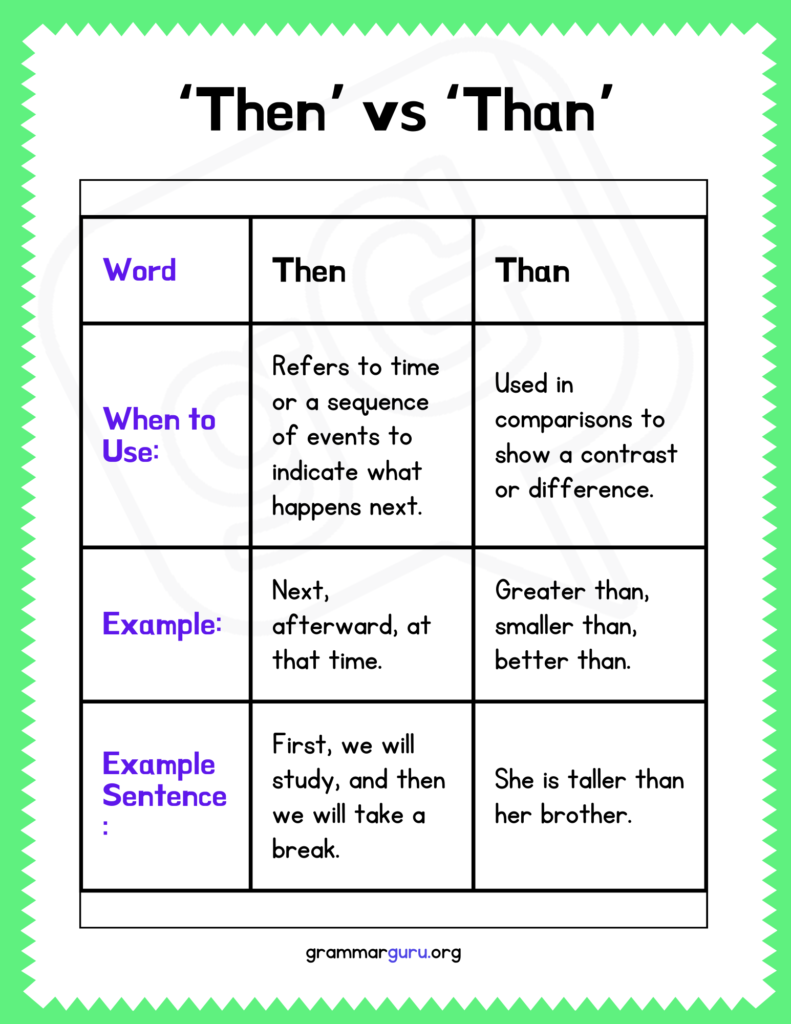Do you struggle knowing the right contexts and uses for the words “then” and “than”? Many people mix up these two common words even though they have very different meanings. Understanding the key differences is essential for communicating clearly in both written and spoken English.
This article will explain when to use “then” versus “than” with definitions, usage guides, and examples to help build your skills for these easily confused words. Being able to properly use “then’ to indicate time sequences or “than” for making comparisons will improve your grammar and communication abilities.
When to Use Then
Then is used when referring to sequences in time order, meaning something happening next or afterwards. It often relates to conditional outcomes, cause-and-effect relationships, or specific sequences of events. Using “then” effectively transitions between occurrences in chronological structure.
Some guidelines for when to use “then”:
- Referring to next step or stage in time order or sequence
- After something else; afterwards
- Joined with “if” in conditional (if x happens, then y will happen) statements
When to Use Than
Than is used exclusively for making comparisons between two or more things. It compares qualities, quantities, preferences, differences, measurements, and other comparative relationships. Using “than” underscores relative positions or contrasts between elements.
Guidelines for using “than”:
- Comparing two or more people, things, groups, amounts, concepts etc.
- To compare differences in quality, size, preferences, age etc.
- Indicating greater than, less than, more desirable than etc.
Key Differences:
- Then:
- Time or Sequence: Used to indicate what happens next.
- Examples: Next, afterward, at that time.
- Than:
- Comparison: Used to show a contrast or difference
- Examples: Greater than, smaller than, better than.
- Remember:
- Then: Think Next in Time.
- Than: Think Comparison.
10 Sentences from ‘Then’:
Remember:
- Then: Think “Next in Time.”
- First, we will gather all the necessary materials, and then we can start the experiment.
- We finished our homework, and then we went out to play.
- If it rains, then we will have to reschedule the outdoor event.
- She studied for hours, and then she aced the exam.
- We waited for the bus, and then it finally arrived.
- The alarm clock rang, and then I woke up to start my day.
- We practiced the dance routine, and then we performed it on stage.
- If you finish your chores, then you can have some ice cream.
- We listened to the lecture attentively, and then we asked questions.
- I’ll complete the report, and then I’ll submit it to the supervisor.
10 Sentences from ‘Than’:
Remember:
- Than: Think “Comparison.”
- Apples are healthier than candies.
- She is taller than her younger sister.
- I would rather read a book than watch TV.
- Running is faster than walking.
- He is more interested in science than in history.
- It’s warmer in summer than in winter.
- I’d prefer pizza than sushi for dinner.
- Swimming is more exciting than jogging for me.
- Chocolate is sweeter than vanilla ice cream.
- Studying is more important than playing games right now.

